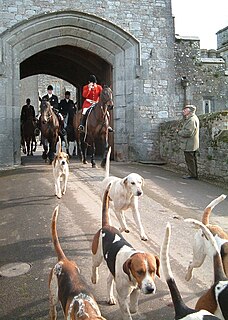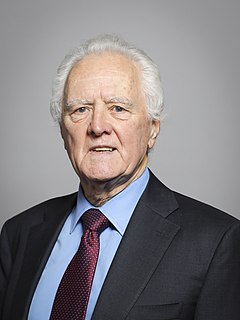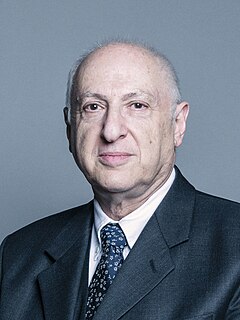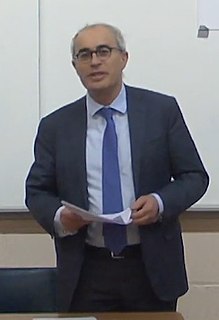
The Burns Inquiry (or Committee of Inquiry into Hunting with Dogs in England and Wales) was a Government committee set up to examine the facts in the debate in the United Kingdom about hunting with hounds.

The Burns Inquiry (or Committee of Inquiry into Hunting with Dogs in England and Wales) was a Government committee set up to examine the facts in the debate in the United Kingdom about hunting with hounds.
In December 1999, the then Home Secretary, Rt. Hon. Jack Straw MP, announced the establishment of a Government inquiry into hunting with dogs, to be chaired by the retired senior civil servant Lord Burns. Its terms of reference were:
The committee commissioned a range of scientific research, undertook a series of visits to hunting events [2] and held a number of evidence hearings. The committee did not seek "to address the ethical aspects of the subject". [3] [4]
Following consultation with Lord Burns, Jack Straw MP appointed the following to membership of the committee: [5]
The League Against Cruel Sports criticised the appointment of several members with backgrounds related to hunting. [5]

The committee's most reported conclusion was that hunting with dogs "seriously compromises" the welfare of the quarry species. [6] In line with its remit, the committee did not, however, draw any conclusion on whether hunting should be banned or should continue. [3] In a later debate in the House of Lords, the inquiry chairman, Lord Burns, also stated that "Naturally, people ask whether we were implying that hunting is cruel... The short answer to that question is no. There was not sufficient verifiable evidence or data safely to reach views about cruelty. It is a complex area." [7]
In a highly controversial subject area, the Burns Inquiry report was welcomed by both hunters [8] and anti-hunting campaigners. [9]
Following the publication of the Burns Inquiry report, the Government introduced an 'options bill' which allowed each House of Parliament to choose between a ban, licensed hunting, and self-regulation. The House of Commons voted for a banning Bill and the House of Lords for self-regulation. After further inquiries, the Government introduced a further Bill, which was amended to become the Hunting Act 2004.[ third-party source needed ]

The Privy Council of the United Kingdom is a formal body of advisers to the sovereign of the United Kingdom. Its membership mainly comprises senior politicians who are current or former members of either the House of Commons or the House of Lords.

Fox hunting is an activity involving the tracking, chase and, if caught, the killing of a fox, traditionally a red fox, by trained foxhounds or other scent hounds. A group of unarmed followers, led by a "master of foxhounds", follow the hounds on foot or on horseback.

The Parliament Acts 1911 and 1949 are two Acts of the Parliament of the United Kingdom, which form part of the constitution of the United Kingdom. Section 2(2) of the Parliament Act 1949 provides that the two Acts are to be construed as one.

Whilst the House of Lords of the United Kingdom is the upper chamber of Parliament and has government ministers, it for many centuries had a judicial function. It functioned as a court of first instance for the trials of peers, for impeachments, and as a court of last resort in the United Kingdom and prior, the Kingdom of England.
Elfyn Llwyd is a Welsh barrister and politician. He was a Member of Parliament, representing Meirionnydd Nant Conwy in the House of Commons from 1992 to 2010 and Dwyfor Meirionnydd from 2010 to 2015. Llwyd was Plaid Cymru's Westminster parliamentary group leader.

John Francis McFall, Baron McFall of Alcluith is a Scottish politician, now the Lord Speaker having previously been Senior Deputy Speaker of the House of Lords from 1 September 2016 to 30 April 2021. He was previously a Labour and Co-operative Member of Parliament from 1987 to 2010, first for Dumbarton and then from 2005 for West Dunbartonshire. He also served as Chairman of the House of Commons Treasury Committee.

Alexander Charles Carlile, Baron Carlile of Berriew, is a British barrister and crossbench member of the House of Lords. He was the Member of Parliament (MP) for Montgomeryshire from 1983 to 1997.
The League Against Cruel Sports, formerly known as the League for the Prohibition of Cruel Sports, is an animal welfare charity which campaigns to stop blood sports such as fox, hare and deer hunting; game bird shooting; and animal fighting.

The Hunting Act 2004 is an Act of the Parliament of the United Kingdom which bans the hunting of wild mammals with dogs in England and Wales; the Act does not cover the use of dogs in the process of flushing out an unidentified wild mammal, nor does it affect drag hunting, where hounds are trained to follow an artificial scent.

Peter Robert Henry Mond, 4th Baron Melchett, also known as Peter Melchett, was an English jurist and politician. He succeeded to the title of Baron Melchett in 1973.

Hare coursing is the pursuit of hares with greyhounds and other sighthounds, which chase the hare by sight, not by scent.

David Philip Pannick, Baron Pannick, QC is a leading barrister in the United Kingdom, and crossbencher in the House of Lords. He practises mainly in the areas of public law and human rights. He has argued cases before the Supreme Court of the United Kingdom, the Appellate Committee of the House of Lords, the European Court of Justice, and the European Court of Human Rights.

A working terrier is a small type of dog which pursues its quarry into the earth. According to the Oxford English Dictionary, the name dates back to at least 1440, derived from French chien terrier 'digging dog', from Medieval Latin terrarius, ultimately from Latin terra (earth).

Opposition to hunting is espoused by people or groups who object to the practice of hunting, often seeking anti-hunting legislation and sometimes taking on acts of civil disobedience, such as hunt sabotage. Anti-hunting laws, such as the English Hunting Act 2004, are generally distinguishable from conservation legislation like the American Marine Mammal Protection Act by whether they seek to reduce or prevent hunting for perceived cruelty-related reasons or to regulate hunting for conservation, although the boundaries of distinction are sometimes blurred in specific laws, for example when endangered animals are hunted.

Terence Burns, Baron Burns, sometimes known as Terry Burns, is a British economist, made a life peer in 1998 for his services as former Chief Economic Advisor and Permanent Secretary to HM Treasury. He is currently Senior adviser to Santander UK, Non-Executive Chairman of Glas Cymru, and a non-executive director of Pearson Group plc. He is also President of the National Institute of Economic and Social Research, President of the Society of Business Economists, Ex Chairman of the Governing Body of the Royal Academy of Music, and Ex Chairman of the Monteverdi Choir and Orchestra he is now Chairman of the Young Classical Artists Trust (YCAT). On 5 November 2009 he was announced chairman Designate of Channel Four Television Corporation, succeeding Luke Johnson, who retired on 27 January 2010 following six years in the post.

Ernest Jackson Lawson Soulsby, Baron Soulsby of Swaffham Prior was a British microbiologist and parasitologist. In 1990 he was made a Conservative life peer and sat in the House of Lords until his retirement in December 2015.

The Protection of Wild Mammals (Scotland) Act is an Act of the Scottish Parliament passed in February 2002, making Scotland the first part of the United Kingdom to ban traditional fox hunting and hare coursing.

R (Jackson) v Attorney General [2005] UKHL 56 is a House of Lords case noted for containing obiter comments by the Judiciary acting in their official capacity suggesting that there may be limits to parliamentary sovereignty, the orthodox position being that it is unlimited in the United Kingdom.

Paul Benedict Cullen, Lord Pentland, is a former Solicitor General for Scotland, a Senator of the College of Justice and former Chairman of the Scottish Law Commission.
Sir Rabinder Singh, styled The Rt. Hon. Lord Justice Singh, is a British Court of Appeal judge and President of the Investigatory Powers Tribunal, formerly a High Court judge of the Queen's Bench Division, a Queen's Counsel and barrister, formerly a founding member of Matrix Chambers and a legal academic.